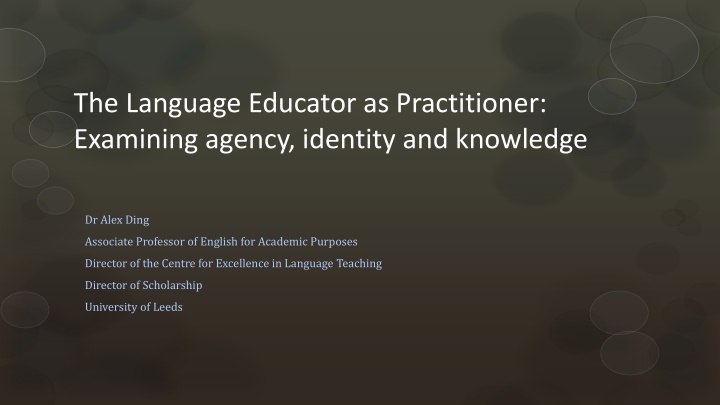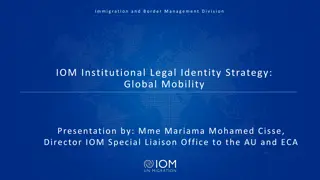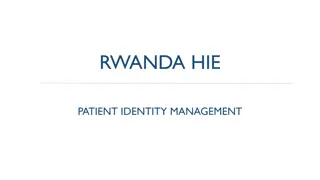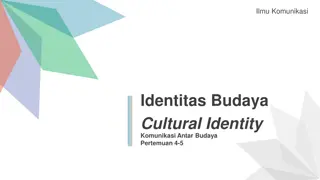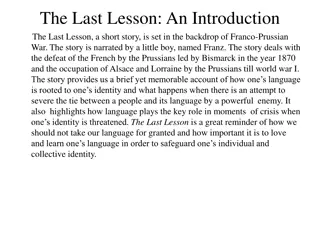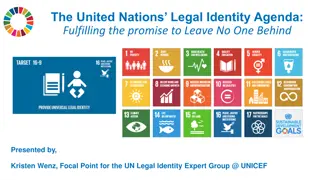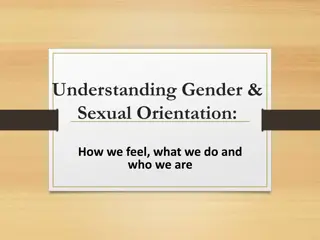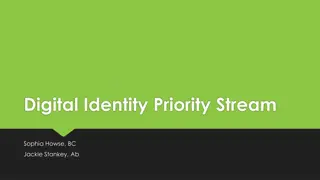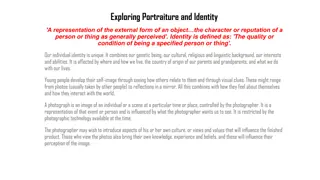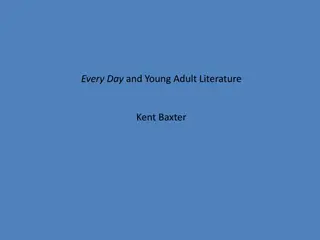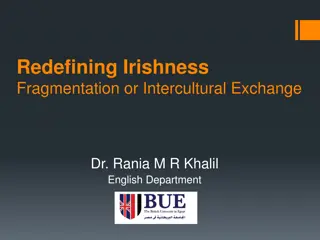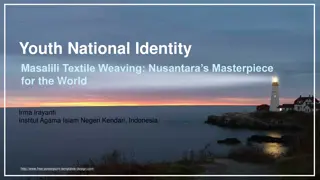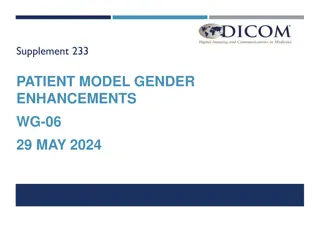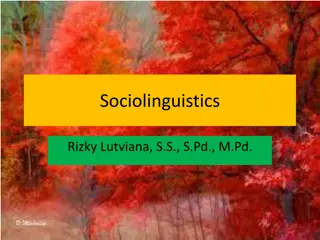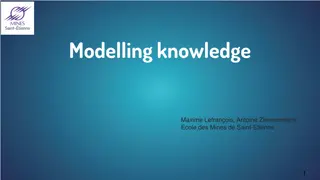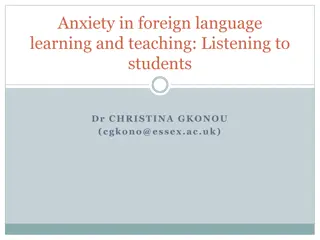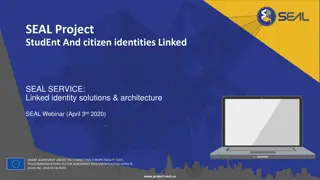Examining Agency, Identity, and Knowledge in Language Education
In this study, Dr. Alex Ding delves into the complex interplay between agency, identity, and knowledge among language educators. The discourse explores the challenges practitioners face in balancing self-worth and social identity, impacting their roles within educational frameworks. The examination of structural forces, such as neoliberalism, sheds light on how educators navigate evolving contexts and redefine their professional identities. Insights on socialization, reflexivity, and performativity offer a profound analysis of the dynamics shaping the landscape of language education.
Download Presentation

Please find below an Image/Link to download the presentation.
The content on the website is provided AS IS for your information and personal use only. It may not be sold, licensed, or shared on other websites without obtaining consent from the author.If you encounter any issues during the download, it is possible that the publisher has removed the file from their server.
You are allowed to download the files provided on this website for personal or commercial use, subject to the condition that they are used lawfully. All files are the property of their respective owners.
The content on the website is provided AS IS for your information and personal use only. It may not be sold, licensed, or shared on other websites without obtaining consent from the author.
E N D
Presentation Transcript
The Language Educator as Practitioner: Examining agency, identity and knowledge Dr Alex Ding Associate Professor of English for Academic Purposes Director of the Centre for Excellence in Language Teaching Director of Scholarship University of Leeds
Whats at stake there is increasing danger for practitioners that self-worth and social identity are at odds with one another with the attendant risk that practitioners withdraw their active personification to become passive executors of minimalistic and enforceable expectation (p. 304) a performance rather than a performative expression of the self (p. 303). Ding and Bruce (2017)
Plan Structural forces that shape us as language educators Socialisation of/as practitioners Knowledge Identity and reflexivity
Structural forces that shape us as language educators: neoliberalism Neoliberalism is in the first instance a theory of political economic practices that proposes that human well-being can best be advanced by liberating individual entrepreneurial freedoms and skills within an institutional framework characterized by strong private property rights, free markets and free trade. The role of the state is to create and preserve an institutional framework appropriate to such practices. The state has to guarantee, for example, the quality and integrity of money. It must also set up those military, defence, police and legal structures and functions required to secure private property rights and to guarantee, by force if need be, the proper functioning of markets. Furthermore, if markets do not exist (in areas such as land, water, education, health care, social security, or environmental pollution)then they must be created, by state action if necessary. But beyond these tasks the state should not venture. State interventions in markets (once created) must be kept to a bare minimum because, according to the theory, the state cannot possibly possess enough information to second-guess market signals (prices) and because powerful interest groups will inevitably distort and bias state interventions (particularly in democracies) for their own benefit (Harvey 2005:2).
Neoliberalism a state under the supervision of the market rather than a market supervised by the state (Foucault 2008:16)
The neoliberal academic: Our days are numbered literally Entrepreneurial (never ending self-development self-promotion ) the re-invention of professionals themselves as units of resource whose performance and productivity must constantly be audited so that it can be enhanced (Shore & Wright 1999: 559) Performativity skills of presentation and of inflation, making the most of ourselves, making a spectacle of ourselves. We become transparent but empty, unrecognisable to ourselves (Ball, 2012 ) Ontological and professional insecurity (why are we doing this?) Discourse of metrics, rankings, outputs, impact, generating profits, grant capture, world-class, excellence (I note the irony!)
The neoliberal student: human capital Consumer of education Instrumental Student as personification of market forces Aspirational social capital/status Producers and consumers of economic wealth Avoiding risks, experimentation, intellectual challenges Conservative Seekers of satisfaction, experience, employment and useful transferable skills
Socialisation/Habitus and Structure Socialisation refers to: The way in which the outer, the disciplinary matrix, its networks and canons, represented within as a structuring of consciousness and of self, and this is the basis of competence, of the capacity to participate, produce and contribute. The key relationship, then, is between the manner in which knowledge has developed within an intellectual field and the manner in which individuals become members of fields, of how, as Bourdieu puts it, the scientist becomes the scientific field made flesh . (Moore, 2009, p. 148)
Socialisation of practitioners It is mainly through mastery of propositional knowledge that novices gain access to and get admitted into their respective discourse communities. Without knowing the language of the community (i.e., propositional or declarative knowledge), one would be left out of any discussion which might result in the development of the self, since there is no essential unsocialized way of thinking that can be depended upon as the basis for critical reflection (Fendler, 2003, p. 20). If novices to the profession are not familiar with the field s theoretical knowledge, they will lose the chance of developing their full potentials (Hedgcock, 2002). Akbari, 2007, p. 203.
Socialisation of practitioners Unlike more established and traditional professions there is little to no prior socialisation. only a very weak link between how knowledge has developed within EAP/MFL and the ways in which individuals become members of the field most often takes place in situ and often ad hoc becoming a practitioner only begins after entering the field
Socialisation and cultural capital [i]ndividuals will possess cultural capital in proportion to the status of their specialized field in the social space and their position within their specialized field Moore, 2009, p. 150. Given that most academic fields and the most powerful professions require a considerable number of years of specialised study and socialisation before entry, in contrast to entry to EAP [MFL???] for practitioners, it is less than surprising that practitioners have little cultural capital within academia. Ding and Bruce, 2017
Developing cultural capital Development of practitioners, then, is also about enhancing the cultural capital and status of practitioners because without cultural capital practitioner agency, recognition, identity and roles in contributing to the university are quite restricted. Development of practitioners is not just about self-development or professional development it is also about developing the profession and enabling the profession to exert greater influence within academia: development is about agency and structure. Ding and Bruce (2017)
Reflexivity & Agency Reflexivity is not: narcissistic reflexivity (Bourdieu, 2000) or hermeneutic narcissism (Maton, 2003) where: It becomes less and less important to know very much (or to be able to teach very much) because simply knowing who you are (and the Other who you are not) is sufficient (Moore, 2009, p. 59)
Reflexivity For Archer, the self is a causal agent a project maker (Archer 2003, p. 105) - and who we are is a matter of what we care about most and the commitments we make accordingly (p. 120). We define our commitments through repeated reflexive internal conversations, specifically by: [engaging] in intense questioning about the terms and conditions of endorsing any of these scenarios [life projects], which it has already deemed worthwhile, with the aim of determining whether or not she has the wherewithal to see through the one she is most drawn. (Archer, 2000, p. 103)
Reflexivity discernment deliberation - dedication We are existentially driven, through reflexive internal conversations to define and commit to what we care about the most. This is what gives each of us a sense of authenticity and unique personal identity: we are what we care about and what we commit ourselves to in objective circumstances not of our own choosing.
EAP Practitioners as Social & Corporate Agents actors find a role in which they feel they can invest themselves, such that the accompanying social identity is expressive of who they are as persons in society (ibid). There is a further nuance that Archer specifies and that is of corporate agency: Its typical powers are capacities for articulating shared interests, organising for collective action, generating social movements and exercising corporate influence in decision- making. (p. 266)
They bring to it [the role] or them [the roles] their singular manner of personifying it or them and this, in turn, has consequences over time. What it does creatively is to introduce a continuous stream of unscripted performances, which also over time can cumulatively transform role expectations. These creative acts are the transformations of society s very normativity, which is most clearly spelt out in the norms attaching to specific roles. (Archer, 2000, p. 296)
Knowledge Maton (2003) provides a reminder that there is epistemic capital in research and, we would argue, development and scholarship: actors within the intellectual field engage in strategies aimed at maximising not merely resources and status but also epistemic profits, that is, better knowledge of the world . (p. 62)
Identity, agency and reflexivity Who we are is a matter of what we care about most and the commitments we make accordingly (Archer, 2003: 120) The only way that this tension between personal aspirations and social expectation can be resolved is by practical action. Archer, 2003:123. Self-transformation entails projects which involve self-modification but which are also expressions of social critique and quests for social transformation. Archer 2003: 128.
self it is imperative that we know our powers, our liabilities, our objective position in the world, our resources and our values. In short we can critique our social ontologies and can attempt to change them.
Association & Solidarity Corporate agency is the we of collective action whose members share its goals and organisation (p. 267). The we of corporate agency is a step towards social transformation (p. 267). The power of corporate agents is the: very special punch that they pack as far as systematic stability and change are concerned. Only those who are aware of what they want, can articulate it to themselves and others, and have organised in order to obtain it, can engage in concerted action to reshape or retain the structural and/or cultural features in question. (p. 265)
Associations often poor at public policy, often apolitical The professional association exists to advance the standing of the members of the occupation or profession by setting educational and other standards governing the profession, advocating for favourable public and private policies, aiding members in their professional development, and advancing professional practice through research and information dissemination. (Lamb, 2012, p. 289)
Scholarship. Simple heuristic We develop a scholarship of teaching when our work as teachers becomes public, peer-reviewed and critiqued. And exchanged with members of our professional communities so they, in turn, can build on our work. Shulman, 2000:49. [T]he core values of professional communities revolve around the expectation that we do not keep secrets, whether of discovery or of grounded doubt. Schulman, 2000:50.
Scholarship withdrawing from SoTL or non-engagement with SoTL carries risks . by withholding contributions to scholarship we are potentially limiting our own agency, limiting our ability to influence structural change and accepting of changes and practices defined and decided by others.
Scholarship Scholarship is, in a way, an invitation a challenge - to reconsider our identity as language educators: it suggests an identity that expands into areas often occluded in the past to one that is more visible, more vocal, making contributions to professional knowledge, exerting influence, shaping practices and policies, engaging with students differently and accumulating social and epistemic capital and recognition
references AKBARI, R. 2007. Reflections on reflection: A critical appraisal of reflective practices in L2 teacher education. System, 35, 192-207. ARCHER, M. S. 2003. Structure, Agency and the Internal Conversation. Cambridge, England, Cambridge University Press. BASTURKMEN, H. L. 2014. LSP teacher education: Review of literature and suggestions for the research agenda. Ib rica, 28, 17-34. BELCHER, D. 2006. English for specific purposes: Teaching to perceived needs and imagined futures in worlds of work, study, and everyday life. TESOL Quarterly, 40, 133-156. BELCHER, D. 2013. The future of ESP research: Resources and access and choice. In: PALTRIDGE, B. & STARFIELD, S. (eds.) Handbook of English for Specific Purposes. Boston, US, Blackwell Publishing. BENESCH, S. 1993. ESL, Ideology, and the Politics of Pragmatism. TESOL Quarterly, 27, 705-17. CHARLES, M. & PECORARI, D. 2015. Introducing English for Academic Purposes, Abingdon, England, Routledge. DING , A and BRUCE, I. (in press) The English for Academic Purposes Practitioner: Operating at the Margins of Academia. Palgrave. DUDLEY-EVANS, T. & ST JOHN, M. J. 1998. Developments in English for specific purposes: A multi-disciplinary approach, Cambridge, England, Cambridge University Press. HADLEY, G. 2015. English for academic purposes in neoliberal universities: A critical grounded theory, Heidelberg, Germany, Springer International Publishing. HAMP-LYONS, L. 2011. English for academic purposes: 2011 and beyond. Journal of English for academic purposes, 10, 2-4. HARWOOD, N. & PETRIC, B. 2011. English for Academic Purposes. In: Simpson, J. (ed.) Handbook of Applied Linguistics. London, England, Routledge.
references LILLIS, T. & TUCK, J. 2016. Academic literacies: A critical lens on reading and writing within the academy. In: HYLAND, K. & SHAW, P. (eds.) The Routledge Handbook of English for Academic Purposes. Abingdon, England Routledge. MATON, K. 2003. Reflexivity, relationism and research: Pierre Bourdieu and the epistemic conditions of social scientific knowledge. Space and Culture, 6, 52-65. MOORE, R. 2009. Towards the Sociology of Truth, London, England, Continuum. MORGAN, B. 2009. Fostering transformative practitioners for critical EAP: Possibilities and challenges. Journal of English for Academic Purposes, 8, 86 99. STEVENSON, M. & KOKKIN, B. 2007 Pinned to the margins? The contextual shaping of academic language and learning practice. Journal of Academic Language and Learning, 1, 44 54.
